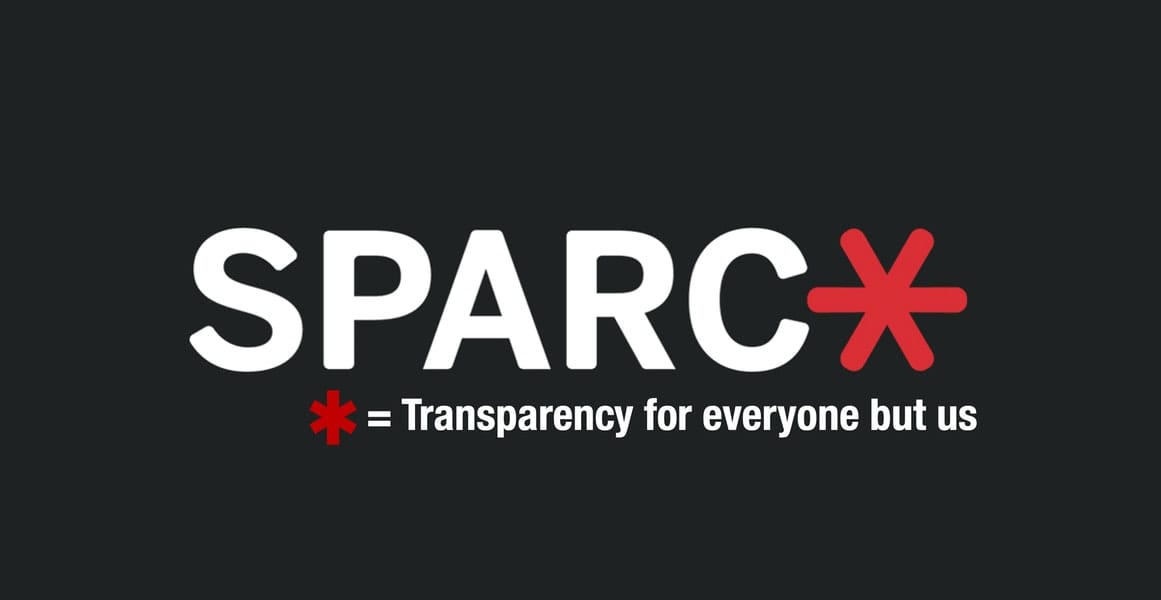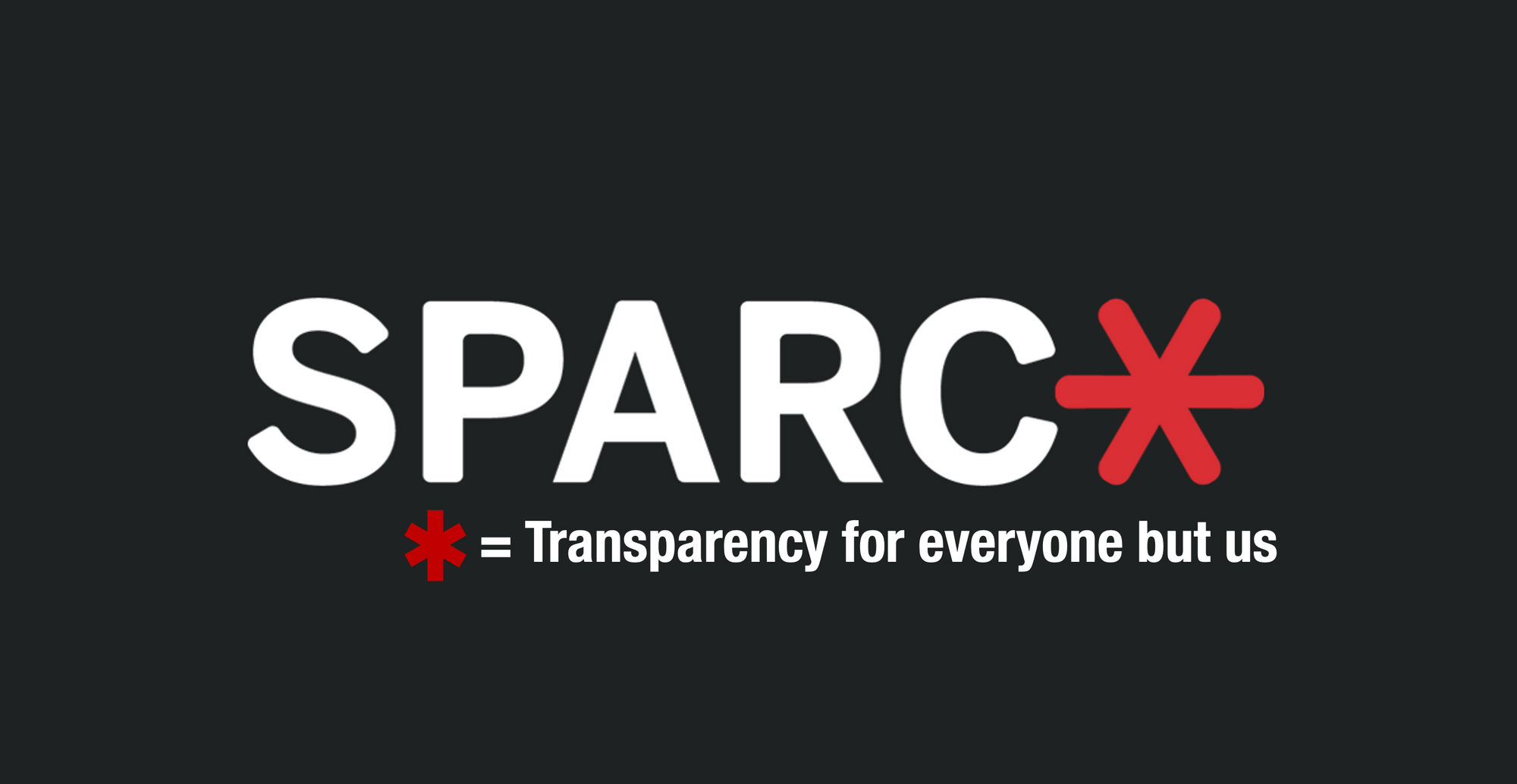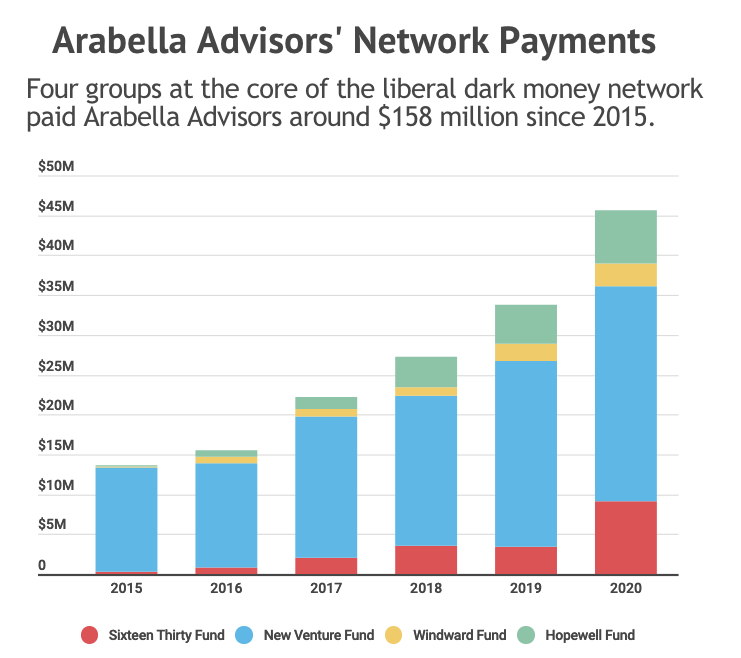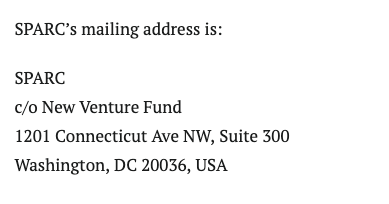SPARC, PACs, and Paychecks
Dark money, hidden influence, and selective secrecy fan the flames at SPARC

In December 2018, I described how SPARC isn’t a non-profit but is supported via a fiscal sponsorship arrangement as a project in a non-profit affiliated with a large, for-profit consulting firm. Given some potentially inflammatory aspects, I suggested SPARC was sitting on a powder keg.
The non-profit in question — New Venture Fund (NVF) — supports liberal-leaning political and advocacy initiatives. The fiscal sponsorship agreement with SPARC commenced in 2014, and seemed like just so much paperwork at the time. But it has struck people as odd and not a little inappropriate for an organization advocating openness, since the arrangement — and choices within it made by SPARC — obscure the organization’s grants (incoming and outbound), assets, revenues, and expenses.
Last week, Richard Poynder published an interview with Heather Joseph, SPARC’s Executive Director, along with a summary of some of the insights he gleaned from examining SPARC, NVF, and Arabella Advisors, the for-profit behind NVF. Arabella is a consultancy with offices in Washington, DC, New York, Chicago, San Francisco, and Durham, NC.
In Poynder’s interview, we learned or confirmed a few things:
- Joseph is an employee of NVF, not SPARC, with her pay stub reading “New Venture Fund”
- Joseph’s salary is larger than the fees paid to NVF by SPARC, so the salary is not just a pass-through
- Some donors to SPARC wish to remain anonymous
- The financials for SPARC could be made publicly available if SPARC wished — NVF doesn’t prevent them from doing this
The purpose, practices, and reputation of the entity (NVF) paying salaries at SPARC matters, of course, as do SPARC’s choices about transparency and disclosure, especially when juxtaposed with its stances about openness and access to information.

What Is NVF?
Arabella Advisors is a Washington, D.C.-based philanthropy consulting company. This puts it in consistent contact with rich philanthropists. Arabella founded NVF in 2006, and Eric Kessler — the founder of Arabella — served on the Board of NVF until 2019. Other executives in Arabella have also served on NVF’s board over the years.
Arabella and NVF are linked to what OpenSecrets.org calls “liberal ‘dark money’ groups,” raising money for political campaigns and PACs. This involves NVF and other Arabella-associated non-profits, like the Sixteen Thirty Fund:
Overall, Sixteen Thirty Fund raised nearly $528 million in the two-year election cycle [for 2020], according to tax returns reviewed by OpenSecrets and first reported by Politico. . . .
More than $86.2 million of Sixteen Thirty Fund’s windfall came from its sister 501(c)(3) group, New Venture Fund, which tax documents show raised over $965 million — nearly $1 billion — in 2020 from a myriad of anonymous sources.
Since New Venture Fund is a 501(c)(3) nonprofit, individual donors can write off their contributions as tax-deductible even though some of the nonprofit’s money is given to more politically active groups. . . .
New tax records reviewed by OpenSecrets reveal that New Venture Fund was primarily funded by multimillion dollar donations in 2020 with just eight anonymous donors giving tens of millions of dollars each in 2020 making up the bulk of its fundraising. Two donors gave over $100 million each.
Yesterday, the New York Times examined the emergence of liberal “dark money” groups, including Arabella Advisors, the Sixteen Thirty Fund, and NVF, noting that these funds are asymmetrical in their secrecy:
While the Arabella-managed groups do not disclose their donors, foundations backed by some of the biggest donors on the left have disclosed major donations to the network. Pierre Omidyar, the billionaire eBay founder, disclosed personal and foundation gifts of $45 million to Sixteen Thirty and $1.6 million to Hopewell. A foundation backed by George Soros disclosed gifts of $17 million to Sixteen Thirty and $5 million to Hopewell.
In addition to other efforts, these groups seek to shape the media, according to the Times:
[Arabella’s Hopewell Fund] . . . gave $8.1 million to a dark-money group called Acronym, which spent millions of dollars on Facebook advertising and backed a company called Courier Newsroom that published articles favoring Democrats and received millions of dollars from dark money groups. It was paid $2.6 million by a nonprofit linked to House Democratic leadership to promote articles.
In short, NVF is not a grassroots fundraising operation, but part of a coalition of non-profit groups used by the rich and powerful to influence elections through anonymous spending and media manipulation.
The for-profit Arabella earns fees back from its own fundraising non-profits, with OpenSecrets charting the fees returned to Araballa from four of the largest (NVF is the largest, in blue):

To say that Arabella Advisors and NVF are kissing cousins isn’t exactly right. They’ve been much more than that — as noted above, sharing board members until recently, as well as sharing office space, as their current addresses show:
- Arabella Advisors — 1828 L St. NW, Suite 300, Washington, DC 20036
- New Venture Fund — 1828 L St. NW, Suite 300-A, Washington, DC 20036
Co-location has been a constant, as Arabella and NVF shared office space at 1201 Connecticut Avenue NW, Suite 300, Washington, DC, before 2020, when both moved to the address above.
Both the Windward Fund and the Hopewell Fund — which also share web design templates — reside at an address that was simultaneously occupied by SPARC during the 2020 US election cycle:
- 1201 Connecticut Avenue NW, Suite 300, Washington, DC
Who Pays SPARC’s Salaries?
In 2020, according to Joseph, SPARC had revenues of $3.25 million — a combination consisting mostly of grant funds and member dues:
SPARC Revenues (2020)
Contributed (Grant) Funds: $1,631,549
Member Dues: $1,433,797
Events/Conferences: $ 166,940
Other Income $ 19,476
Total Revenue: $3,251,762
While not providing expenses in the Poynder interview — a notable exclusion — Joseph stated that the fees SPARC pays to NVF amount to “8% to 9% of our total expenses.”
It seemed possible that Joseph’s salary would be a pass-through from SPARC’s revenues, with NVF simply processing paychecks for her. However, assuming expenses do not exceed revenues, the most SPARC paid NVF in 2020 would be $292,658, which is less than Joseph’s salary and benefits. This adds to the impression that NVF is supporting SPARC fully, including paying salaries. Given that payroll and all its ancillary aspects have to be generated by an entity registered in various ways SPARC isn’t, I think it’s safe to assume that NVF is paying the salaries and benefits of SPARC’s other employees, as well.
If NVF is indeed paying SPARC’s employees, the source of those funds becomes central to the reputation of SPARC, its officers, and its workers. That is, how NVF and its affiliated entities make money — and why and where they spend it — redound to SPARC’s reputation and credibility.
Who Pays SPARC’s Rent?
SPARC is currently located at 1201 Connecticut Avenue NW, Suite 608. In early 2020, SPARC moved from its prior lodgings at 21 DuPont Circle, Suite 800, to occupy the offices NVF had just departed:

This address crops up again. Based on updates to its web pages, SPARC remained here until July 2021, when it moved three flights up, to Suite 608, in the same building.
This timeline has some significance, as it indicates SPARC was occupying offices that were also being used by the Arabella-associated non-profits raising hundreds of millions of dollars for various political campaigns and PACs as part of a “dark money” operation, according to OpenSecrets.org.
Where Do SPARC’s Revenues Go?
The short answer is that we don’t know how SPARC spends its money. SPARC does not disclose the grants it makes, and in her interview with Poynder, Joseph only lists grants SPARC received, not grants it made. Her justification for this opacity doesn’t cut both ways — sure, some donors to SPARC want to remain anonymous (leaving us to wonder about those motives), but why SPARC won’t list out the grants it has made is a separate question. Do recipients want to remain anonymous, too? Or does SPARC want to conceal its influence?
Is SPARC Open and Transparent?
All of this is legal, but whether it is ethical and fits with SPARC’s mantra of openness, community, and transparency are bigger questions. The irony of an organization dedicated to openness and transparency working within a “dark money” political fundraising operation while choosing to shield its books from public scrutiny can’t be avoided.
SPARC’s virtue signaling becomes a bit harder to swallow as it has operated cheek-by-jowl alongside what one expert in political fundraising called “one of the largest [political] fundraising machines I have ever come across,” and with its employees paid by same.
Shielding its books from public scrutiny while sponsored by a group protecting mega-donors from disclosure makes it harder for SPARC to argue against barriers to access to knowledge and data, criticize opaque contract terms, take stands against unclear pricing, decry any lack of public access, promote the need to default to “open,” and push against confidentiality clauses and NDAs — all of which feature in recent SPARC messages:
Defending SPARC’s limited public disclosures, Joseph describes the organization’s reporting practices as “fairly standard across North American non-profit organizations — including those of most colleges and universities.” This is easily shown to be a lie. For example, the Harvard University Band discloses more than SPARC, as do the Whiffenpoofs of Yale University.
American non-profit organizations have annual reporting requirements through which they divulge a number of important financial, accounting, and governance details. SPARC does nothing of the kind, choosing — it appears — to reveal as little as possible, using “donor anonymity” as a fig leaf.
Wikipedia has a surprisingly eloquent description of what a non-profit disclosure ideal represents in this regard:
The key aspects of nonprofits are accountability, trustworthiness, honesty, and openness to every person who has invested time, money, and faith into the organization. Nonprofit organizations are accountable to the donors, founders, volunteers, program recipients, and the public community.
One option for SPARC would be to voluntarily disclose information along the lines of the EZ version of the 990 form (990-EZ), and do this on an annual basis — and perhaps in arrears — to disclose top-level information about SPARC and its finances and governance. The Princeton University Rowing Association seems to manage it, with $12,063 in revenue.
SPARC Europe is registered as a non-profit in the Netherlands.
What About Now?
In her interview with Poynder, Joseph claims that the SPARC Steering Committee signed off on involvement with NVF in 2014 with complete knowledge of what NVF represented, how it related to Arabella Advisors, and how political fundraising factored into these organizations’ affair:
Yes, I do believe our member community is aware of the arrangements. The relationship with NVF was fully vetted by our Steering Committee back in 2014 before we signed the agreement.
If you are part of SPARC’s member community, then nothing here should be news to you — not the shared offices, the dark money, the hidden finances.
SPARC’s arrangement with NVF is renegotiated annually. With what Poynder gleaned from his interview with SPARC’s Executive Director and some of the information here and elsewhere, will SPARC’s Steering Committee recommend renewing when the issue arises this year?
Or will these factors make NVF and Arabella a little too hot for SPARC?
Tomorrow
Tomorrow’s subscriber post will discuss OA.Works, another project linked to Arabella, NVF, and SPARC which makes questionable claims about its status as a legal entity and doesn’t divulge its revenues or spending.